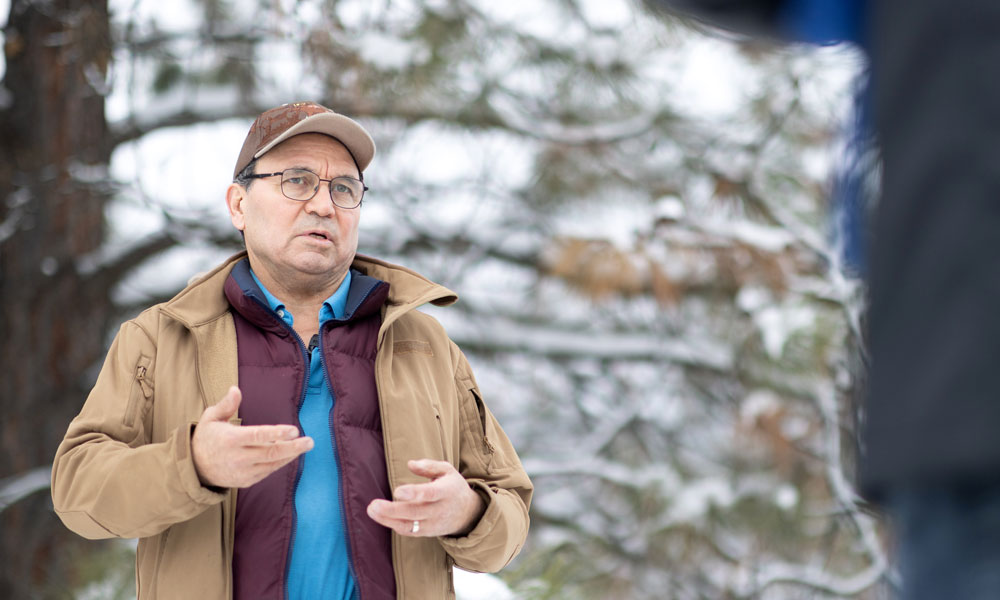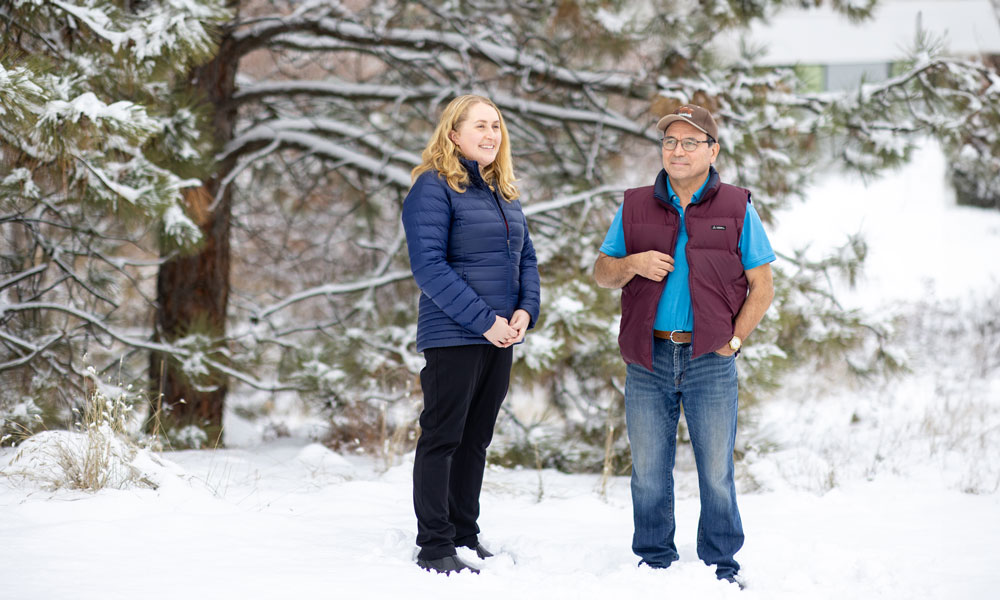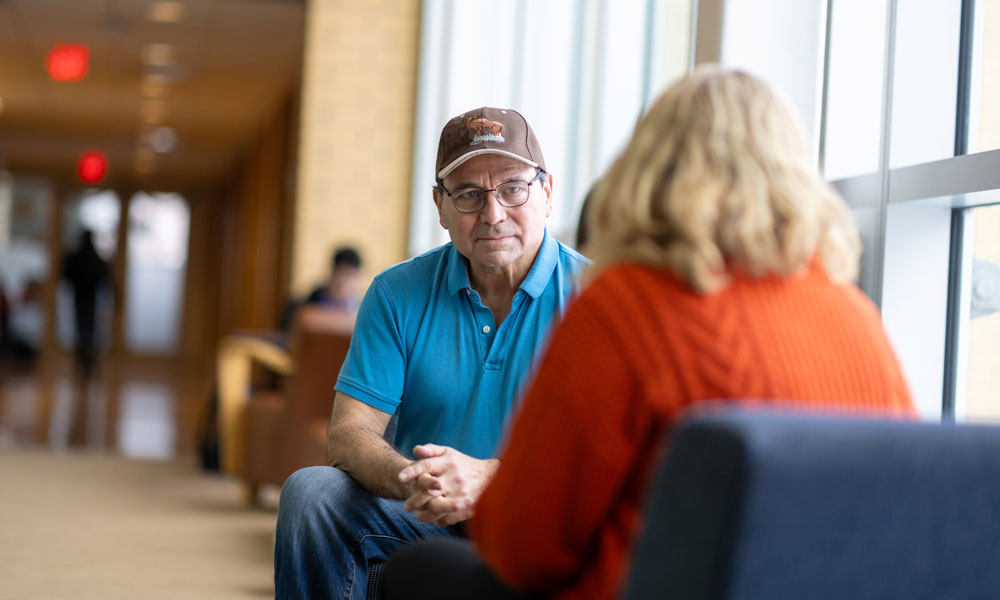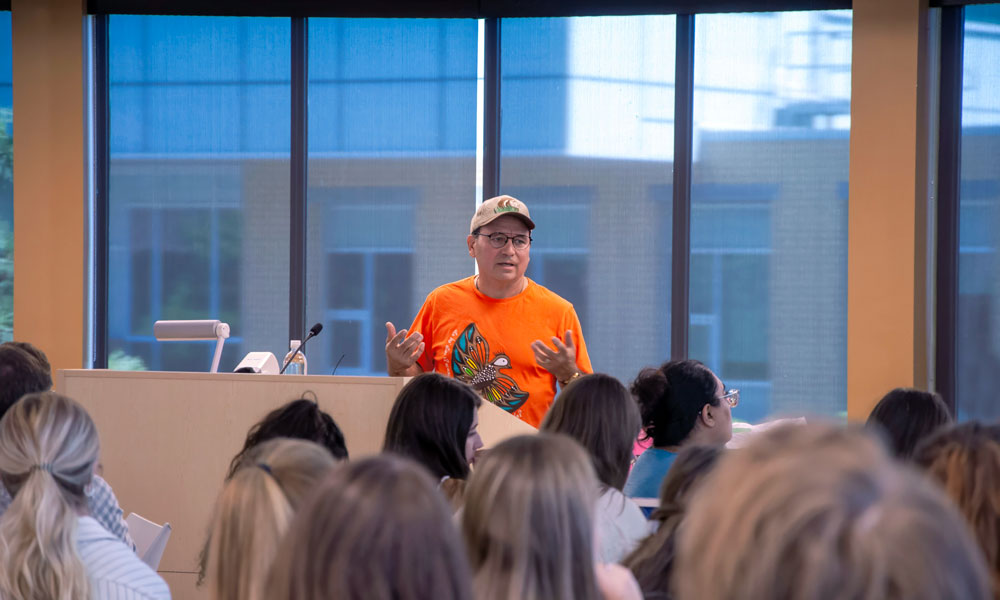
LINNEA HARDER REALIZED SHE WANTED TO STUDY EDUCATION during walks with her father near their home along British Columbia’s Sunshine Coast.
Her dad is also a teacher, and together, they’d marvel at the wonders around them, leaving the UBC Okanagan Bachelor of Education (B.Ed.) graduate with a deep appreciation for the natural world.
“I was fortunate to grow up near the beach. We’d spend countless hours exploring tidal pools and forests,” Harder says. “The Sunshine Coast, with the ocean and the mountains nearby, is the best of both worlds.”
Understanding the value of blending different worlds, Harder chose UBC Okanagan for her teaching degree. She appreciates that the Okanagan campus offers a closely knit community that’s backed by UBC’s global reputation.
UBC Okanagan also introduced her to Dr. Bill Cohen. The Assistant Professor joined the UBC Okanagan School of Education (OSE) in 2020 as an Indigenous Scholar. His teaching is grounded in his Syilx homeland, where UBC Okanagan is located.
Harder says students recognize the wisdom and insight in Dr. Cohen’s perspective.

Dr. Bill Cohen is an Assistant Professor and an Indigenous scholar in the UBC Okanagan School of Education.
“Education isn’t just about imparting knowledge,” Harder says. “It’s about fostering an environment where students can develop ideas, create projects and grow. For example, if a student wanted to create a community garden, I’d want to be the teacher who helps them bring that to life.”
Dr. Cohen has spent his career engaging with and sharing Syilx and Indigenous knowledge ways with students such as Harder.
He’s eager to show how respective Indigenous peoples globally can contribute to and transform the world’s most pressing issues: food insecurity, climate change, cultural and ecological homogenization, racialized and gendered violence, and political polarization.
“Syilx Okanagan pedagogy expresses an obligation to future generations and the tmixʷ, the Syilx Four Food Chief communities of water, earth, plant and animal interdependent life-force strands,” Dr. Cohen says.
“The Four Food Chiefs story is about very diverse communities collectively and continuously creating a food and wellness secure future. We humans have the potential and responsibility to become the continuing story.”

Bachelor of Education student Linnea Harder speaks to Assistant Professor Dr. Bill Cohen at UBC Okanagan.
He also shares stories of how some Indigenous peoples view Western education; stories that reverberate in light of efforts to identify unmarked graves on the grounds of residential schools across North America.
Still, Dr. Cohen wants UBC Okanagan graduates to feel encouraged, not intimidated, to teach Indigenous students.
“Despite historical injustices, many Indigenous Peoples have maintained hope in the potential of education,” he says. “Teacher education bears a significant responsibility since it involves passing knowledge to the next generation.”
Traditionally, Indigenous peoples had no input in the curriculum—no say in its content, teaching methods or instructors. But colonial patriarchy, othering and exclusion are slowly being influenced by Indigenization, he says.
“It’s pragmatic, humanizing and critical in this era of racialized violence, violence against life-giver—women and the earth mother—to learn from and with Indigenous peoples. Indigenization is for all peoples and communities so we can all have a future.”
For educators inside the Okanagan School of Education, Indigenization involves connecting to Syilx peoples, education and resources to transform destructive aspects of schooling. Diversity and inclusion ritualized into practice—made a part of our everyday lives—means our collective intellectual and creative potential is much greater with women and Indigenous peoples contributing to the knowledge and wisdom our children have access to, Dr. Cohen says.
Dr. Margaret Macintyre Latta, the School of Education’s director, and Dr. Wendy Klassen, the previous director of Undergraduate Programs, transformed the B.Ed. program through partnerships with Indigenous communities, a process they call co-curricular making.
“We’re seeking ways to honour Syilx connections to land, culture and the relational self—it grounds all our efforts,” Dr. Macintyre Latta says. “In doing so, the school is investing in classrooms as sites for disrupting colonial relationships and promoting relationship-building.”
Okanagan School of Education has shifted from teaching a traditional, content-based curriculum to one grounded in inquiry to illustrate a willingness to adapt. These changes open doors to incorporate more holistic approaches to teaching, emphasizing genuine understanding over rote memorization, and align with Indigenous communities, she says.
“We’ve established ourselves as a ‘community of scholar-practitioners,’” Dr. Macintyre Latta says. “This philosophy embodies our belief that, as educators, our learning journey is continuous. We’re committed to aligning ourselves with the ever-evolving needs of our students while also being mindful of the specifics of context and place. In this way, we aim to foster both individual and collective growth, always remaining receptive to new ideas and insights.”

Despite historical injustices, many Indigenous Peoples have maintained hope in the potential of education, Dr. Cohen says.
UBC Okanagan revitalized its B.Ed. in 2018 in response to Truth and Reconciliation Calls to Action and the United Nations Declaration on the Rights of Indigenous Peoples, among other local and global efforts.
Okanagan School of Education encourages students to adopt the scholar-practitioner mindset, understanding that their experiences during their studies will shape their teaching philosophies and practices. Within the program, students join learning communities that help them critically assess and develop their beliefs about teaching and learning, preparing them for roles now and in the future.
In the classroom, students are exposed to such experiences as a Welcome to the Land by Syilx Elders, which offers a more profound perspective than a routine land acknowledgment. Further, they hear stories from Dr. Cohen about the Indigenous Food Chiefs as one tangible tool to relay Syilx culture and traditions to new generations.
Students like Harder welcome time with educators such as Dr. Cohen and Okanagan Nation Alliance (ONA) Elders. She says her placement with the ONA and Elder Leon Louis of the Lower Similkameen Indian Band at kłlilx’w (Spotted Lake) put real-world focus on her education.

Dr. Cohen teaches UBC Okanagan students about his Syilx home and the Syilx peoples.
The lake is sacred to the ONA, and it took many years to reclaim it from private ownership. It holds ceremonial and spiritual significance.
“It was an amazing experience. Just being present in that space, acknowledging the surroundings—from the horses on the hill to the chirping birds and the rustling of the leaves in the wind,” Harder says. “Being present and truly listening is vital. When it’s my turn to teach my students about Indigenous perspectives and the importance of the land, I’ll emphasize the need to recognize and appreciate nature holistically.”
It wasn’t unlike those walks with her father along the Sunshine Coast. Her experience is a reflection of how students want to learn, Harder says. UBC Okanagan connects students with the communities and the lands to cultivate deep understanding.
It can be a challenging process, Harder says, but it’s ultimately rewarding.
“You might feel out of your comfort zone, but pushing through those moments makes you grow,” she says. “Connect with as many people as possible; they’ll make the journey richer. In teaching, you won’t know everything, and that’s okay. What matters is the community, relationships and knowledge you build along the way.”